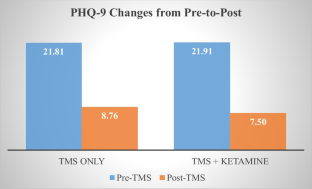Psychopharmacology ( IF 3.4 ) Pub Date : 2024-03-12 , DOI: 10.1007/s00213-024-06573-1 Nathaniel A. Shanok , Sabrina Muzac , Leah Brown , Melissa Barrera , Raul Rodriguez

|
Objective
Major Depressive Disorder (MDD) is a pervasive psychiatric condition effecting approximately 21 million adults in the U.S. (8.4%). An estimated 30–60% of patients are resistant to traditional treatment approaches (medications and talk-therapy), alluding to the need for additional options. Two promising treatment modalities include transcranial magnetic stimulation (TMS) and ketamine infusions; both have shown efficacy in standalone studies but have scarcely been investigated synergistically in the same group of participants.
Method
In the current study, 169 participants with treatment-resistant MDD received 36 treatments of Deep TMS-only (H1 + H7 protocols), while 66 received 36 treatments of Deep TMS (H1 + H7 protocols) and 6 IV infusions of ketamine over the course of 9 weeks. Depressive symptoms were compared pre- and –post treatment in both conditions using the PHQ-9.
Results
In both treatment groups, depressive symptoms were significantly reduced from pre-to-post and there were no significant differences in response between the TMS + ketamine condition and the TMS-only condition. The TMS + ketamine condition had an 80.30% response rate (53 out of 66) and 43.42% remission rate (28 out of 66) compared to a 76.92% response (130 out of 169) and 39.64% remission (67 out of 16) in the TMS-only condition.
Conclusion
These results support the notion that TMS treatments yield high response rates in treatment-resistant cases; however, in this investigation there was no added benefit for including 6 sessions of IV ketamine in conjunction with TMS. Future investigations using randomized-control designs and robust outcome measures are warranted.
中文翻译:

深度 TMS 疗法与静脉注射氯胺酮联合治疗重度抑郁症:一项试点研究
客观的
重度抑郁症 (MDD) 是一种普遍存在的精神疾病,影响着美国约 2100 万成年人 (8.4%)。据估计,30-60% 的患者对传统治疗方法(药物和谈话疗法)有抵抗力,这表明需要其他选择。两种有前景的治疗方式包括经颅磁刺激(TMS)和氯胺酮输注;两者都在独立研究中显示出功效,但几乎没有在同一组参与者中进行协同研究。
方法
在当前研究中,169 名患有难治性 MDD 的参与者接受了 36 次仅深度 TMS 治疗(H1 + H7 方案),而 66 名参与者在整个过程中接受了 36 次深度 TMS 治疗(H1 + H7 方案)和 6 次氯胺酮静脉输注9周。使用 PHQ-9 比较两种情况治疗前和治疗后的抑郁症状。
结果
在两个治疗组中,抑郁症状从治疗前到治疗后均显着减轻,并且 TMS + 氯胺酮条件和仅 TMS 条件之间的反应没有显着差异。TMS + 氯胺酮治疗的缓解率为 80.30%(66 例中有 53 例),缓解率为 43.42%(66 例中有 28 例),而缓解率为 76.92%(169 例中有 130 例),缓解率为 39.64%(16 例中有 67 例)在仅 TMS 条件下。
结论
这些结果支持这样的观点,即 TMS 治疗在治疗耐药病例中产生高反应率;然而,在本次调查中,静脉注射氯胺酮 6 次并结合 TMS 并没有带来额外的好处。未来的研究需要使用随机对照设计和稳健的结果测量。



























 京公网安备 11010802027423号
京公网安备 11010802027423号